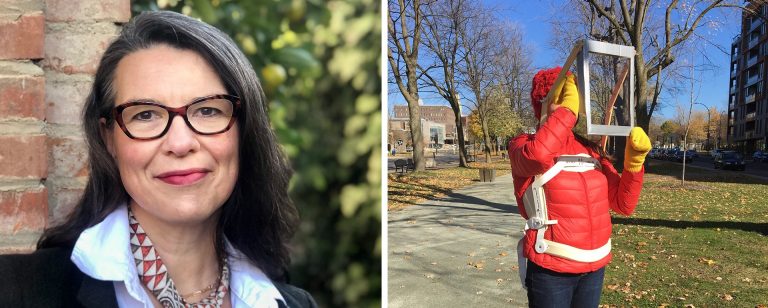Concordia’s Nancy Long wins Prix Relève étoile Paul-Gérin-Lajoie for innovative art education research

Nancy Long, a PhD student in the Department of Art Education, has been awarded December’s Prix Relève étoile Paul-Gérin-Lajoie from the Fonds de recherche du Québec (FRQ).
She secured the honour for her paper, “In lieu of flowers: An a/r/tographic journey of apology and forgiveness.” The paper was published in the peer-reviewed International Journal of Education Through Art.
The FRQ confers three $1,500 Relève étoile prizes monthly intended to promote and recognize exceptional research by graduate students and postdoctoral fellows in the province. Eligible research is categorized by Society and Culture, Nature and Technology, and Health.
Long’s paper explores ambiguity and risk-taking in art education through her research-creation project. The project centred around the Place-du-6-décembre-1989 site, a public memorial to the victims of the Montreal École Polytechnique massacre.
Long explored her fraught relationship with the site, which she had been purposefully ignoring for 20 years. She employed a unique drawing technique, using acetate to trace landscapes.
The material’s transparency meant she could not see what she was drawing. The images were only revealed when she placed a piece of blank paper behind the acetate.
“I wanted to wrestle and dissect all the feelings brought up by the ambiguous drawing technique as well as the uncertainty of what I would encounter at the site,” explains Long. “I gave in to uncertainty. I had no idea what would happen or what I would create once I reached the site.”
Reconciling the past
Her research-creation project also became an exploration of memory, apology and atonement.
“One detail that was particularly striking to me is that the Polytechnique massacre lasted 20 minutes, which is how long it takes for me to walk to the site from my house,” says Long.
Using her acetate drawing technique, she drew next to each victim’s marker, also for 20 minutes at a time. The drawings became letters of apology to the victims, for avoiding the site for so long.
She says she hopes her paper will help keep their memory alive and spark discussions on broader social issues, particularly women’s safety.
“The work calls attention to our inadvertent complicity in forgetting what these monuments are supposed to collectively remind us of,” Long says.
She adds that she wants her research to act as a starting point for conversations about art’s role in addressing societal challenges. Long encourages educators to use public monuments as tools for teaching and reflection, emphasizing the importance of tackling difficult subjects through artistic expression.
She also hopes her research can contribute to our understanding of how to enhance students’ and teachers’ tolerance for uncertainty in the art classroom.
For Long, creativity necessitates risk-taking. Yet being creative requires students to navigate the discomfort of uncertainty — an approach often discouraged by traditional educational systems.
Read Nancy Long’s award-winning paper, “In lieu of flowers: An a/r/tographic journey of apology and forgiveness.“
Learn more about Concordia’s Department of Art Education.




